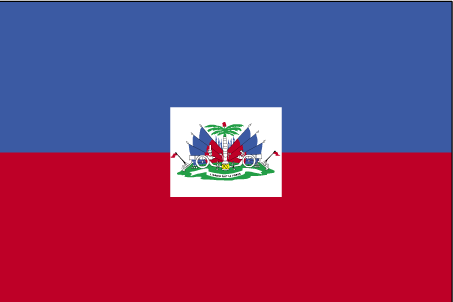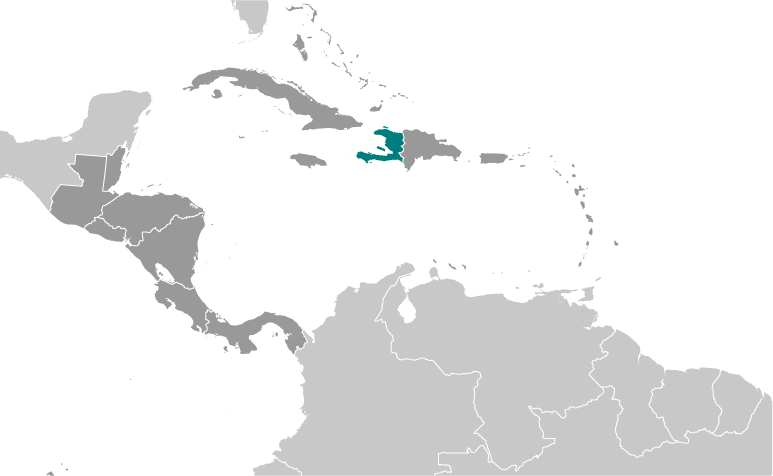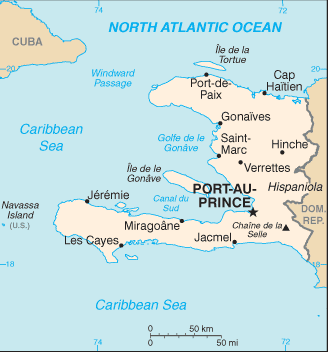The native Taino Amerindians - who inhabited the island of Hispaniola when it was discovered by COLUMBUS in 1492 - were virtually annihilated by Spanish settlers within 25 years. In the early 17th century, the French established a presence on Hispaniola. In 1697, Spain ceded to the French the western third of the island, which later became Haiti. The French colony, based on forestry and sugar-related industries, became one of the wealthiest in the Caribbean but only through the heavy importation of African slaves and considerable environmental degradation. In the late 18th century, Haiti's nearly half million slaves revolted under Toussaint L'OUVERTURE. After a prolonged struggle, Haiti became the first black republic to declare independence in 1804. The poorest country in the Western Hemisphere, Haiti has been plagued by political violence for most of its history. After an armed rebellion led to the forced resignation and exile of President Jean-Bertrand ARISTIDE in February 2004, an interim government took office to organize new elections under the auspices of the United Nations Stabilization Mission in Haiti (MINUSTAH). Continued violence and technical delays prompted repeated postponements, but Haiti finally did inaugurate a democratically elected president and parliament in May of 2006. A massive magnitude 7.0 earthquake struck Haiti in January 2010 with an epicenter about 15 km southwest of the capital, Port-au-Prince. An estimated 2 million people live within the zone of heavy to moderate structural damage. The earthquake is assessed as the worst in this region over the last 200 years and massive international assistance will be required to help the country recover.
Population
9,203,083
Country comparison to the world:88
note:estimates for this country explicitly take into account the effects of excess mortality due to AIDS; this can result in lower life expectancy, higher infant mortality, higher death rates, lower population growth rates, and changes in the distribution of population by age and sex than would otherwise be expected (July 2010 est.)
Nationality
Noun:Haitian(s)
Adjective:Haitian
Ethnic groups
black 95%, mulatto and white 5%
Religions
Roman Catholic 80%, Protestant 16% (Baptist 10%, Pentecostal 4%, Adventist 1%, other 1%), none 1%, other 3%
note: roughly half of the population practices voodoo
Languages
French (official), Creole (official)
Country Name
Conventional long form:Republic of Haiti
Conventional short form:Haiti
Local long form:Republique d'Haiti/Repiblik d' Ayiti
Local short form:Haiti/Ayiti
Government Type
republic
Capital
Name:Port-au-Prince
Geographic coordinates:18 32 N, 72 20 W
Time difference:UTC-5 (same time as Washington, DC during Standard Time)
daylight saving time: +1hr, begins first Sunday in April; ends last Sunday in October
Administrative divisions
10 departments (departements, singular - departement); Artibonite, Centre, Grand 'Anse, Nippes, Nord, Nord-Est, Nord-Ouest, Ouest, Sud, Sud-Est
Independence
1 January 1804 (from France)
National Holiday
Independence Day, 1 January (1804)
Constitution
approved March 1987
note: suspended June 1988 with most articles reinstated March 1989; constitutional government ousted in a military coup in September 1991, although in October 1991 military government claimed to be observing the constitution; returned to constitutional rule in October 1994; constitution, while technically in force between 2004-2006, was not enforced; returned to constitutional rule in May 2006
Legal system
based on Roman civil law system; accepts compulsory ICJ jurisdiction
Suffrage
18 years of age; universal
Executive branch
Chief of state: President Rene PREVAL (since 14 May 2006)
Head of government:Prime Minister Jean-Max BELLERIVE (since 7 November 2009)
Cabinet:Cabinet chosen by the prime minister in consultation with the president
(For more information visit the World Leaders website)
Elections:president elected by popular vote for a five-year term (may not serve consecutive terms); election last held on 7 February 2006 (next to be held in 2011); prime minister appointed by the president, ratified by the National Assembly
Election results:Rene PREVAL elected president; percent of vote - Rene PREVAL 51%
Legislative branch
bicameral National Assembly or Assemblee Nationale consists of the Senate (30 seats; members elected by popular vote to serve six-year terms; one-third elected every two years) and the Chamber of Deputies (99 seats; members elected by popular vote to serve four-year terms); note - in reestablishing the Senate, the candidate in each department receiving the most votes in the last election serves six years, the candidate with the second most votes serves four years, and the candidate with the third most votes serves two years
Elections:Senate - last held on 21 April 2006 with run-off elections on 3 December 2006 (next regular election, for one third of seats, to be held in 2008); Chamber of Deputies - last held on 21 April 2006 with run-off elections on 3 December 2006 and 29 April 2007 (next regular election to be held in 2010)
Election results:Senate - percent of vote by party - NA; seats by party - L'ESPWA 11, FUSION 5, OPL 4, FL 3, LAAA 2, UNCRH 2, PONT 2, ALYANS 1; Chamber of Deputies - percent of vote by party - NA; seats by party - L'ESPWA 23, FUSION 17, FRN 12, OPL 10, ALYANS 10, LAAA 5, MPH 3, MOCHRENA 3, other 10; results for six other seats contested on 3 December 2006 remain unknown
Judicial branch
Supreme Court or Cour de Cassation
Political Parties and Leaders
Artibonite in Action or LAAA [Youri LATORTUE]; Assembly of Progressive National Democrats or RDNP [Leslie MANIGAT]; Convention for Democratic Unity or KID [Evans PAUL]; Cooperative Action to Build Haiti or KONBA [Evans LESCOUFALIR]; Democratic Alliance or ALYANS [Evans PAUL] (coalition composed of KID and PPRH); Effort and Solidarity to Create an Alternative for the People or ESKAMP [Joseph JASME]; Fanmi Lavalas or FL [Rudy HERIVEAUX]; For Us All or PONT [Jean-Marie CHERESTAL]; Front for Hope or L'ESPWA [Rene PREVAL] (alliance of ESKAMP, PLB, and grass-roots organizations Grand-Anse Resistance Committee, the Central Plateau Peasants' Group, and Kombit Sudest); Haitian Christian Democratic Party or PDCH [Osner FEVRY and Marie-Denise CLAUDE]; Haitian Democratic and Reform Movement or MODEREH [Dany TOUSSAINT and Pierre Soncon PRINCE]; Heads Together or Tet-Ansanm [Dr. Gerard BLOT]; Independent Movement for National Reconciliation or MIRN [Luc FLEURINORD]; Justice for Peace and National Development or JPDN [Rigaud DUPLAN]; Liberal Party of Haiti or PLH [Gehy MICHEL]; Merging of Haitian Social Democratic Parties or FUSION or FPSDH [Serge GILLES] (coalition of Ayiti Capable, Haitian National Revolutionary Party, and National Congress of Democratic Movements); Mobilization for Haiti's Development or MPH [Samir MOURRA]; Mobilization for National Development or MDN [Hubert de RONCERAY]; Movement for National Reconstruction or MRN [Jean Henold BUTEAU]; Movement for the Installation of Democracy in Haiti or MIDH [Marc BAZIN]; National Christian Union for the Reconstruction of Haiti or UNCRH [Marie Claude GERMAIN]; National Front for the Reconstruction of Haiti or FRN [Guy PHILIPPE]; New Christian Movement for a New Haiti or MOCHRENA [Luc MESADIEU]; Open the Gate Party or PLB [Anes LUBIN]; Popular Party for the Renewal of Haiti or PPRH [Claude ROMAIN]; Struggling People's Organization or OPL [Edgard LEBLANC]; Union of Nationalist and Progressive Haitians or UNITE [Edouard FRANCISQUE]
Political pressure groups and leaders
Autonomous Organizations of Haitian Workers or CATH [Fignole ST-CYR]; Confederation of Haitian Workers or CTH; Federation of Workers Trade Unions or FOS; General Organization of Independent Haitian Workers [Patrick NUMAS]; Grand-Anse Resistance Committee, or KOREGA; National Popular Assembly or APN; Papaye Peasants Movement or MPP [Chavannes JEAN-BAPTISTE]; Popular Organizations Gathering Power or PROP; Protestant Federation of Haiti; Roman Catholic Church
International organization participation
ACP, AOSIS, Caricom, CDB, FAO, G-77, IADB, IAEA, IBRD, ICAO, ICCt (signatory), ICRM, IDA, IFAD, IFC, IFRCS, ILO, IMF, IMO, Interpol, IOC, IOM, ITSO, ITU, ITUC, LAES, MIGA, NAM, OAS, OIF, OPANAL, OPCW, PCA, PetroCaribe, RG, UN, UNCTAD, UNESCO, UNIDO, Union Latina, UNWTO, UPU, WCO, WFTU, WHO, WIPO, WMO, WTO
Diplomatic representation in the US
Chief of mission:Ambassador Raymond JOSEPH
Chancery:2311 Massachusetts Avenue NW, Washington, DC 20008
Telephone:[1] (202) 332-4090
FAX:[1] (202) 745-7215
Consulate(s) general:Boston, Chicago, Miami, New York, San Juan (Puerto Rico)
consulate(s): Orlando (Florida)
Diplomatic representation from the US
Chief of mission:Ambassador Kenneth H. MERTEN
Embassy:Tabarre 41, Route de Tabarre, Port-au-Prince
Mailing address:use mailing address
Telephone:[509] 229-8000
FAX:[509] 229-8028
Flag description
two equal horizontal bands of blue (top) and red with a centered white rectangle bearing the coat of arms, which contains a palm tree flanked by flags and two cannons above a scroll bearing the motto L'UNION FAIT LA FORCE (Union Makes Strength); the colors are taken from the French Tricolor and represent the union of blacks and mulattoes










